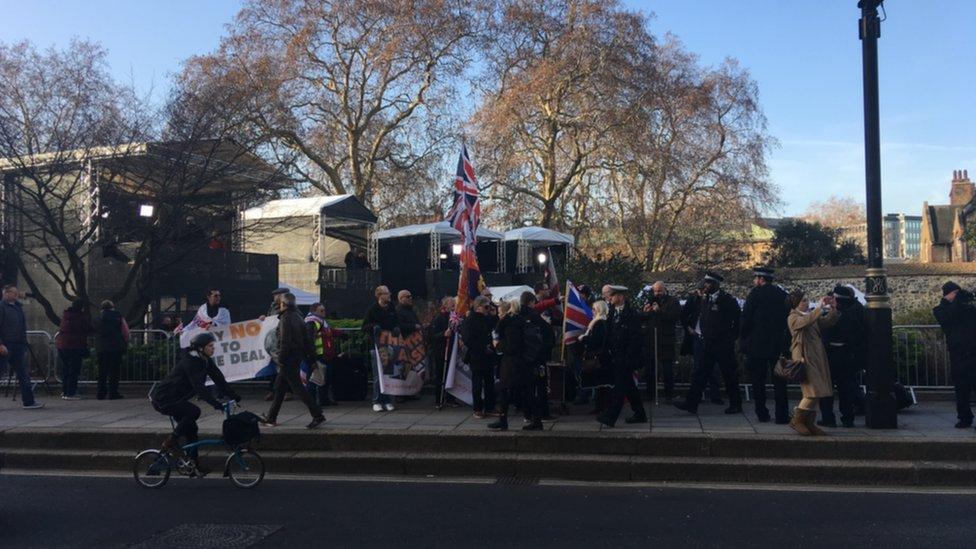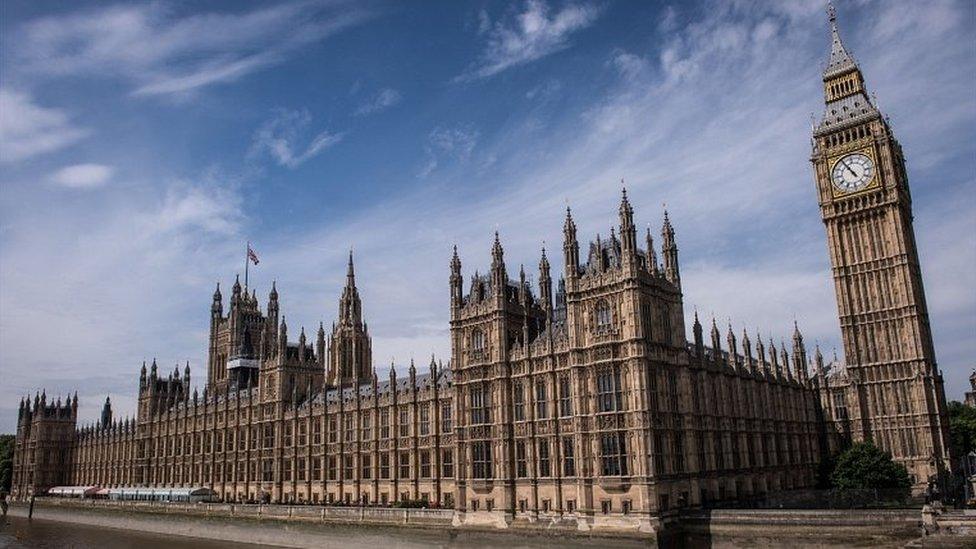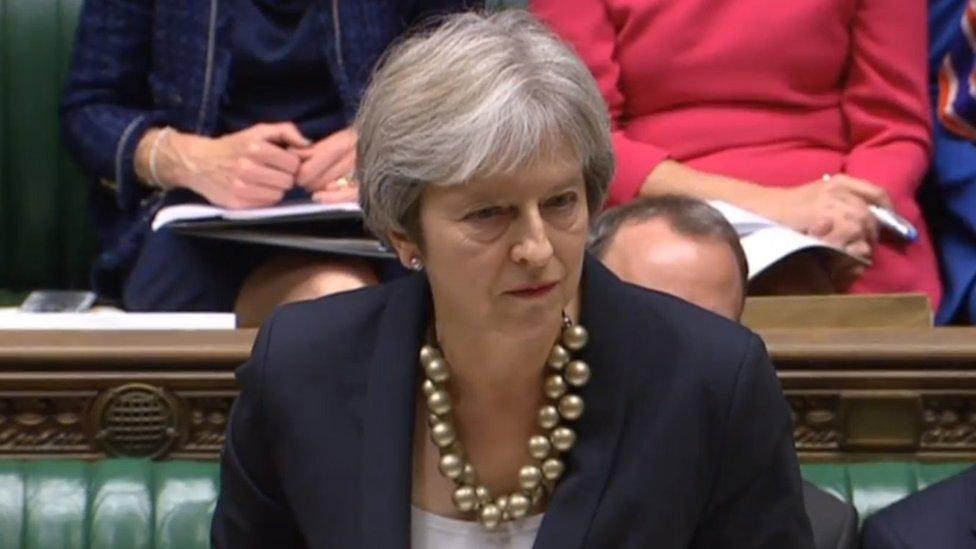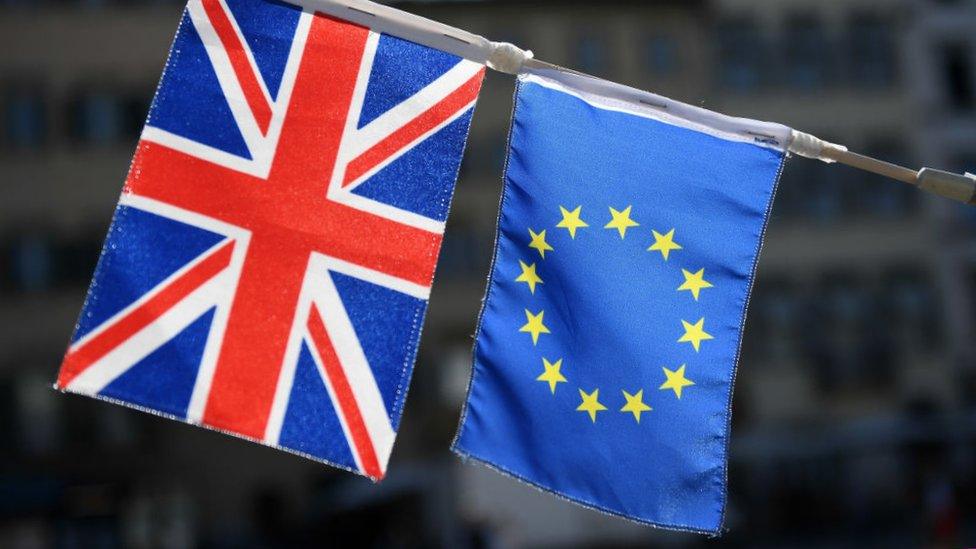A Midlander's view of Westminster's Brexit permacrisis
- Published

The scene outside College Green, Westminster, this week
Perpetual crisis
I took this photo on my way into the BBC's Westminster offices. That's where I am writing this now. I often do the same thing on budget days or on the mornings before state openings, accompanying the images with predictable lines about the media "setting up camp on Westminster's village green".
This time, though, it's different.
That famous green is under a blockade, fenced off apart from one small entrance. The TV outside broadcast gantries look less like a temporary encampment than semi-permanent structures, such is the general air of perpetual crisis now engulfing this place.
Even the pro and anti-Brexit campaigners have grown from what started as a few random hecklers with placards into something much more organised, like an angry football crowd or a political rally.
My impression of a village under siege certainly extends to the Palace of Westminster itself just across the road, where there is currently no Commons majority for anything at all.
Perhaps the most telling moment for me came during Theresa May's statement on Monday following her decision to pull out of the "meaningful vote" on her proposed withdrawal agreement, originally scheduled for the following day.
It's quite something to withdraw from a withdrawal, especially after a succession of senior ministers and Downing Street spokespeople had assured us with unblinking conviction that the vote would go ahead as planned, despite predictions of a heavy defeat.
So the Prime Minister who last year pledged no "snap" general election only to call one, had now promised to go ahead with something only to pull back.

And this was the moment when some of those wavering backbenchers who had been toying with submitting a letter calling for a confidence vote finally made up their minds to do so.
Even at what was undoubtedly one of the lowest points of her turbulent premiership, she summoned the defiance to challenge the Commons: "Does this House really want to deliver Brexit?" Back came the answer, "No!", with sufficient gusto for her to flash them the knowing look of a Prime Minister presenting herself as the agent of the public will, implementing the Referendum, reaching out over the heads of this unruly Parliament.
But the opinion polling guru, Sir John Curtice of Strathclyde University, told us the polls he had seen suggested only one in every five people positively approved of Mrs May's deal while around half opposed it.
Party splits and fragmentation
The problem is of course that her Brexit deal looks nothing like Brexit to the Leave-supporting backbench Tory rebels.
The "Irish backstop" designed to prevent any return to a hard border may not look like a Midlands issue in itself. But it becomes one when our local caucus of eight or so Brexiteer Tory rebels, led by the former Northern Ireland Secretary Owen Paterson, identify it as the main reason why they consider the draft agreement to be beyond the pale. So it was no surprise that he was one of the prime movers for that confidence vote.
But if the Conservatives are split on Brexit, Labour have their divisions too. Another referendum, ideally as a precursor to Britain remaining in the EU, is a notion that may sell well in Labour's Islington, Warwick and Edgbaston constituencies; but it goes down less well well in those areas like Walsall North and Stoke South which switched from Labour to the Conservatives at the last election.

Prime Minister Theresa May is to face a vote of no confidence from Tory MPs
Remember too that Labour still face a challenge to rebuild their core support in major council areas around the Black Country and North Staffordshire, a challenge which surely goes back to those very issues which delivered Leave votes in such industrial quantities.
With the passing of time comes the mounting prospect of "no deal" becoming the real deal. Business organisations like the CBI, IoD and our local chambers of commerce were quick to raise the alarm over the delay to the "meaningful vote" with all the added uncertainty it entails. Now local councils and health authorities are also joining in the howls of anguish over their inability to plan for who knows what.
A game of "no-deal" chicken
Two recent conversations come to mind, both with fellow Midlanders who both have the inside track on this: one in the EU and the other in government.
I asked the Brussels insider if there was a realistic chance, before that much-vaunted "meaningful vote", of an equally meaningful renegotiation of the deal itself, especially that controversial backstop. "None whatsoever," he replied, even though they acknowledged any backstop period would be very uncomfortable for the EU as well as the UK.
No wonder they are talking here about a game of "no-deal chicken".

The other insider, the one at Westminster, would quite like whoever is Prime Minister to play that game themselves. It would go something like this: the PM would remind the European Commission and fellow heads of government that despite 19 months of negotiations it had proved impossible to achieve a deal acceptable to the EU which could carry through Parliament. So, in sorrow more than anger, the UK would pay only half of the £38 billion into the EU because we would be leaving earlier than envisaged in the agreement. Again, more in sorrow than in anger, the UK will have no option but to impose a 10% tariff on those German cars exported into the UK market.
In the event, yet again, what we witnessed was another case of déjà vu: a British Prime Minister traipsing around the capitals of Europe in search of further assurances to help the UK out of a jam.
The Conservative MP for Cheltenham, Alex Chalk, describes this as "a fool's errand". And he's a Government loyalist remember, a Parliamentary Private Secretary at the Department for Education.
So you can imagine what the others were saying.....
And that, more than anything else, has been what finally tipped the Parliamentary Conservative Party into a confidence vote in their leader.
Meantime, the permacrisis goes on and on...